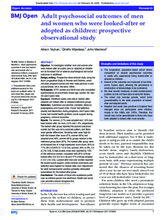Abstract
Objective To investigate whether men and women who were looked-after (in public care) or adopted as children are at increased risk of adverse psychological and social outcomes in adulthood.
Design, setting Prospective observational study using the Avon Longitudinal Study of Parents and Children, which recruited pregnant women and their male partners in and around Bristol, UK in the early 1990s.
Participants 8775 women and 3654 men who completed questionnaires at recruitment (mean age: women 29; men 32) and 5 years later.
Exposure Childhood public care status: looked-after; adopted; not looked-after or adopted (reference group).
Outcomes Substance use (alcohol, cannabis, tobacco) prepregnancy and 5 years later; if ever had addiction; anxiety and depression during pregnancy and 5 years later; if ever had mental health problem; social support during pregnancy; criminal conviction.
Results For women, 2.7% were adopted and 1.8% had been looked-after; for men, 2.4% and 1.4%, respectively. The looked-after group reported the poorest outcomes overall, but this was not a universal pattern, and there were gender differences. Smoking rates were high for both the looked-after (men 47%, women 58%) and adopted (men 44%, women 40%) groups relative to the reference group (both 28%). The looked-after group were at increased risk of a high depression score (men: 26% vs 11%, OR 2.9 (95% CI 1.5 to 5.6); women: 24% vs 9%, 3.4 (2.2 to 5.0)). A high anxiety score was reported by 10% of the reference women, compared with 26% of those looked-after (3.0 (2.0 to 4.5)) and 17% of those adopted (1.8 (1.2 to 2.6)). Looked-after men and women reported the lowest social support, while criminal convictions and addiction were highest for looked-after men. Adjustment for adult socioeconomic position generally attenuated associations for the looked-after group.
Conclusions The needs of those who experience public care as children persist into adulthood. Health and social care providers should recognise this.

